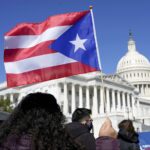Something that really gets in the craw of every crypto investor is the audacity of the US government to think it has de facto rights to tax the living daylights out of crypto profits—especially when escaping the grip of central power is a main attraction to decentralized currencies. But taxes are a difficult thing to shimmy your way out of if you don’t want to be on the lamb from the law.
There are, however, certain steps a person can take to minimize the amount of taxes that are being yoinked out of their wallets. This is why crypto whales and lots of others have been swimming their way over to Puerto Rico. People like Tether co-founder Brock Pierce, Facebook whistleblower Frances Haugen, and even the internet’s infamous Logan Paul all seek a tax haven.
Here’s why Puerto Rico is looking mighty fine right about now.
A bit about Puerto Rico
If you were educated in elite American schools, it’s likely that your comprehensive knowledge of world geography is pulling up Puerto Rico’s exact location in your mind’s eye. But, just on the off chance that you were looking out the window that day in class, Puerto Rico is an island in the Caribbean. South and east of Florida, just fly over Cuba, Haiti, and the Dominican Republic and there you are.
It has a population of around 2.7 million and the median income was $20,474 in 2019. The weather is humid and there’s a rainy season with chances of hurricanes; overall, the climate is fairly consistent.
Puerto Rico is a territory of the US, which means that it’s not a state, but its residents are US citizens. Historically, PR’s economy was supported by sugar production and federal aid from the US. Today, the manufacturing of things like pharmaceuticals, electronics, and textiles has overtaken agriculture as the main industry.
Why people move to Puerto Rico
There are several magnetic forces drawing people to the beautiful island of Puerto Rico. I’ll just hit the highlights to start.
Are the tax incentives worth it?
 There are some considerations every crypto investor should make before uprooting and moving to Puerto Rico because they want that sweet, sweet 0% capital gains tax haven. For instance, there are some significant trade-offs and upfront costs that may not make the savings worthwhile.
There are some considerations every crypto investor should make before uprooting and moving to Puerto Rico because they want that sweet, sweet 0% capital gains tax haven. For instance, there are some significant trade-offs and upfront costs that may not make the savings worthwhile.
From logistical barriers to additional costs you could incur in a move to a new country, here are some other things you should consider before taking the plunge.
Logistics
The first thing to know is if you want to benefit, you can’t just “live” in PR. You really have to live there. Meaning, as a bona fide resident, you must be on the island for 183 days of the year. You also cannot have a “tax home” outside of PR and you can’t have any closer connections than PR—as in, your home, family, possessions, cultural and political connections, banking, voting, and driver’s licence all have to be in PR.
If moving essentially overseas doesn’t make you break a sweat, bully for you. For some of us, the logistics of paperwork, dealing with governments, shipping possessions and a car to the island, and reassembling life in a new place can seem like a big task. In addition to the cost of moving, there are some initial costs in order to take advantage of tax incentives.
Additional costs
To reap the benefits of Act 22 tax incentives, you’ll need to buy a home within two years—not just rent one—and it has to be your primary residence. You’ll also be required to make a $10,000 donation to a charitable organization annually. It’s important to know that your business (and only certain types of businesses at that) must be completely operated in Puerto Rico. You’ll also only be able to get 0% capital gains tax on earnings you make after you are approved as a bona fide resident. Any crypto gains you had before will be subject to normal US tax rates. As you can see, your tax savings would need to be significantly greater than the various costs.
How much should you make before moving?
This might require you whipping out your handy calculator and punching a few numbers to see how much tax you’d save compared to the overall cost of making the move. Some people suggest earning something like $200,000, at least, before it becomes worthwhile. For others, even that is a lowball estimate. Because even if there’s money upside, maybe you can’t hack it on that island life, funny as it sounds.
Adapting to a new culture
Unless you’re a native Spanish speaker or have spent a lot of time in island and latin cultures, it might take some getting used to in your new life. It’s true that English is widely spoken and you can probably manage without knowing Spanish, but it can certainly be a cultural barrier. And sure, the slower place of life is nice during vacation, but when you’re trying to grind every day and get things done, a chilled-out way of living may be an adjustment. Driving habits are different. Social habits are different. It’s a completely different environment and culture shock is a real thing.
Could the tax haven vanish?
There’s also a question of the future when it comes to considering Puerto Rico as a tax haven. If you’re a crypto investor, you likely have a healthy level of skepticism when it comes to governments and politics. There has been a long-running debate about whether Puerto Rico could become a state in the future, and if it did, the tax benefits would likely dry up. Not to mention, if there is political unrest in the domestic US or even within PR, things could get dicey. But I should probably also mention that one potential pro for relocating is if you want to politically diversify, as we’ll discuss next.
Other reasons to move
 There is some overlap in the crypto community with those who want to be prepared for anything.
There is some overlap in the crypto community with those who want to be prepared for anything.
If you’re one of those people, it’s probably smart to politically diversify. In the event that things go sideways at home, it’s smart to have exit strategies in place. Many people try to politically diversify by obtaining dual citizenship in another country. This is easiest to achieve if you have ancestry or roots in another country, but there are some places that offer ways to invest and become a citizen.
While you don’t need a separate citizenship in Puerto Rico, if you want to politically diversify, having your residence off the mainland but maintaining a US passport is not the worst idea in history.
Summary
So, should you move to Puerto Rico? Well…
There are certainly plenty of people who have decided that island life is a dream come true. Incredible 0% capital gains is a good way to save on taxes, but just know that this will change at some point. In the meantime, you can enjoy some awesome views and politically diversify while you’re at it.
But at the end of the day, everyone has different priorities. None of us enjoy having to pony up huge chunks of our kickass crypto gains to the government, but there are only so many bobs and weaves to minimize those costs—PR is definitely a popular one.
What do you think? Is Puerto Rico a good option to preserve your crypto investment gains?
About the Author

Michael Hearne
About Decentral Publishing
Decentral Publishing is dedicated to producing content through our blog, eBooks, and docu-series to help our readers deepen their knowledge of cryptocurrency and related topics. Do you have a fresh perspective or any other topics worth discussing? Keep the conversation going with us online at: Facebook, Twitter, Instagram, and LinkedIn.


